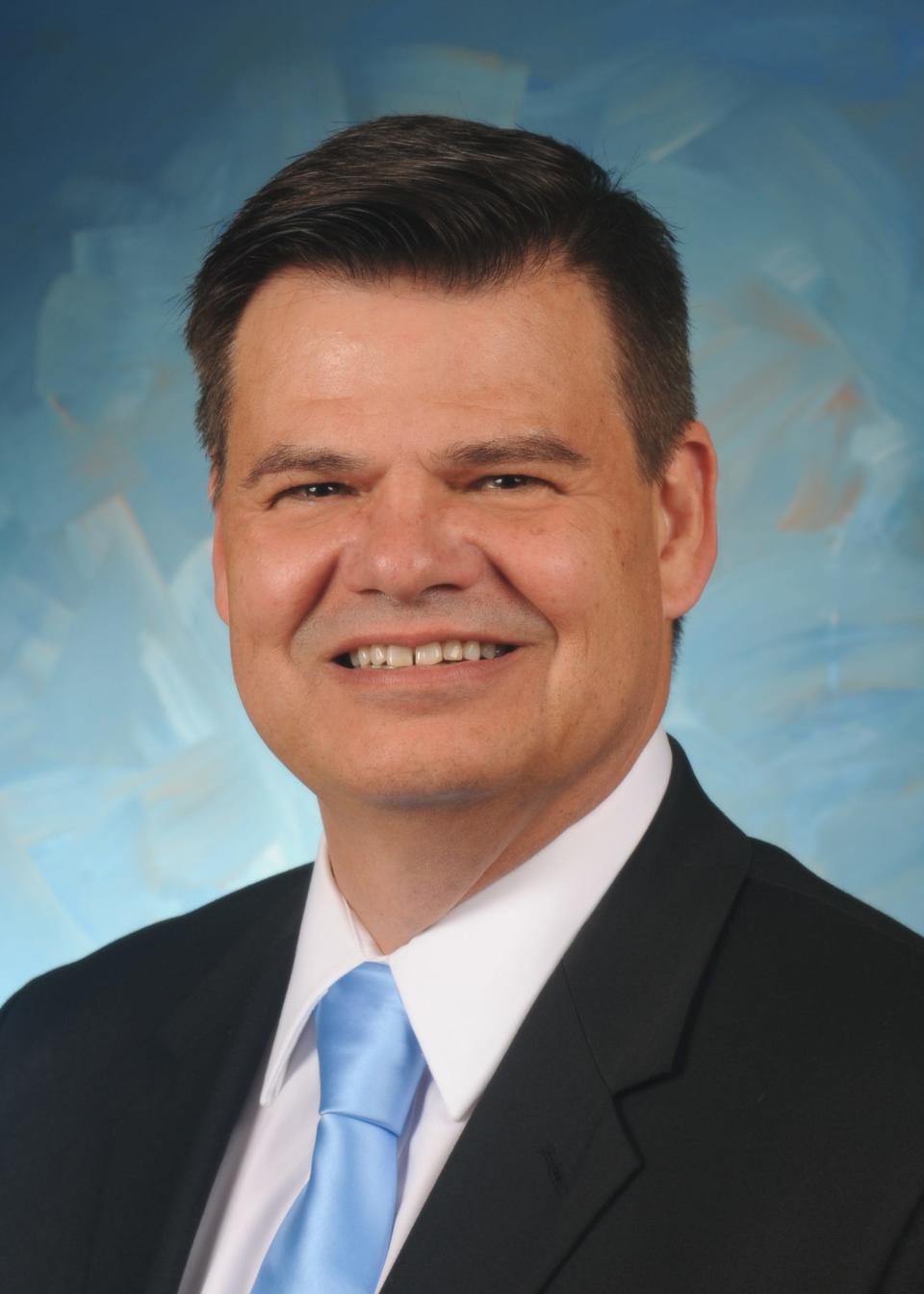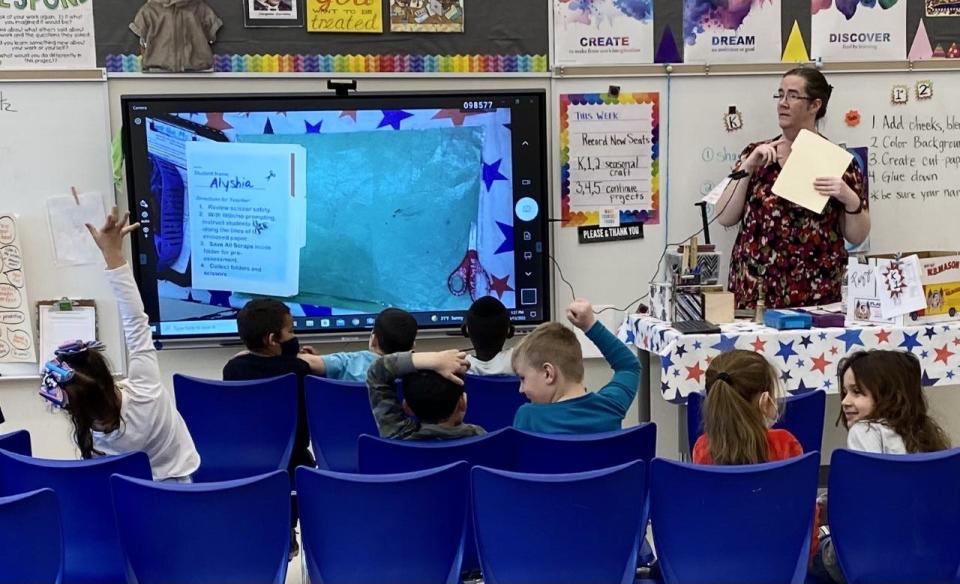Pennsylvania's substitute teacher shortage is now a crisis as the pandemic drags on
There was already a growing substitute teacher shortage before COVID-19, but the pandemic now entering a third year has only turned the problem into a crisis for school districts across Pennsylvania.
In the Stroudsburg Area School District in Monroe County, Superintendent Cosmas Curry said officials are definitely drawing from a smaller pool of available substitutes than in the past.
COVID-19 is a “pinch on the system,” he said, keeping full-time teachers and the substitutes that cover for them out of classrooms.
“It’s been a real challenge,” said Curry. “You can’t deliver education if you don’t have the staff.”
Casey Smith, a spokesman for the Pennsylvania Department of Education, said the department does not track substitute teacher shortages, but has heard “anecdotally from schools” that it is difficult for them to find substitutes.
“This shortage is not new, and is no different than any other shortage we are seeing around the nation, either in the workforce or supply chain,” Smith said.
“The challenges now are the same as they have always been. There is a limited pool of individuals who meet the criteria and want to be substitute teachers,” said Smith. “This includes people looking to become certified to teach, actively working towards certification, certified but unable to find full-time employment, and retired or semi-retired individuals who are interested in acting as substitutes.”
Smith said that day-to-day substitutes do not need to be certified as an educator because districts can hire candidates with bachelor’s degrees under emergency permits. Pennsylvania school districts are responsible for obtaining their own substitutes.
So far in the 2021-22 school year, there have been 13,277 emergency permits issued. A state Department of Education spokeswoman said the 2020-21 numbers were still being processed and were unavailable.
According to the state Department of Education, the number of emergency permits has ballooned since it totaled 8,812 in 2013-14. Here are the totals for emergency permits in Pennsylvania since then:
School year 2014-15 -- 8,962
School year 2015-16 -- 14,357
School year 2016-17 -- 18,216
School year 2017-18 -- 19,596
School year 2018-19 -- 21,512
School year 2019-20 -- 18,457
Shortages have hit schools across the country hard, a survey released last fall showed.
The EdWeek Research Center survey found that more than 75% of school district leaders and principals said they were dealing with “at least moderate staffing shortages,” reported Education Week magazine.
EdWeek reported that 25% of respondents said the shortages were “severe,” while 15% said “very severe” and 37% said shortages were “moderate.” Officials reported shortages of substitute teachers, as well as bus drivers and instructional aides.
A little more than 75% of survey respondents said they were having issues finding substitutes to fill-in for teachers.
“Staffing shortages are hardly a new phenomenon for schools, particularly in rural areas,” wrote EdWeek’s Mark Lieberman. “But district leaders across the country have told Education Week that this year’s problems far outweigh those of previous years. School workers have been increasingly vocal about their frustrations on social media and in union negotiations.”
More: Central Pa.'s labor market is still ailing from the pandemic's 'Great Disruption'
New law might help
Last month, Gov. Tom Wolf signed into law House Bill 412, which backers said would help alleviate the substitute teacher shortage. The bill was introduced in February 2021 by state Rep. Barbara Gleim, R-Cumberland County.
Wolf said in a December statement that the law “allows schools the short-term flexibility to ensure children can safely learn in-person where we know is best for them and their futures.”
Among the changes under the law for the 2021-22 and 2022-23 school years:
Retired teachers are eligible to fill teacher vacancies on an emergency or short-term basis.
Schools can use eligible college students and recent college graduates from education programs to work as substitute teachers.
Teachers with active Pennsylvania certificates and those with comparable out-of-state certificates can serve as day-to-day substitutes for 20 days, or longer under certain circumstances.
Teachers with inactive certificates may substitute for 180 days instead of 90 days per school year.
Individuals who are 25 or older, have at least 60 college credits or three years of experience as a paraprofessional, and complete training on classroom management, are allowed to serve as classroom monitors by delivering pre-planned assignments for a teacher.
Rich Askey, the president of the Pennsylvania State Education Association (PSEA), the state’s largest teacher's union, told the USA TODAY Network that the law was a “really good, strong first step” that hopefully will ease the pressure on schools struggling to cover COVID-19 teacher absences.
“The substitute teacher shortage is definitely at a crisis level in most of Pennsylvania,” he said, “and the pandemic has only made the situation worse.”
More: Gov. Tom Wolf talks COVID strategy as omicron spreads, 2022 agenda and plans after office
Teaching 2 classes at once

There are several factors fueling the shortage, but the main one, as Smith mentioned, is that fewer people want to be substitutes. Much of that drop-off comes from the declining number of college students pursuing teaching careers and using substitute work as a way to land full-time jobs with districts.
Chris Lilienthal, a PSEA spokesman, said there were 21,000 first-year teaching certifications in the 2010-11 school year, but by 2019-20 that number had fallen to 6,900.
A teacher shortage has been discussed for 10 years in Pennsylvania, Askey said, but the pandemic has brought the crisis to new heights as schools decimated by COVID-19 in their teacher ranks are having some teachers handle two classes at once.
Askey said a friend who teaches is doing just that, and teaching earth science and physical science classes at the same time in her school’s library.
“She just goes back and forth,” Askey said. “Fortunately, she’s a great teacher and she can handle it, but you can imagine how exhausted she is at the end of the day.”
And, those issues are happening nationwide, not just in Pennsylvania. In one Oklahoma City suburb, local police officers were recently assigned to cover 6th grade classes due to staff shortages their department said in a Facebook post.
Moore police officers step in as substitutes. pic.twitter.com/7vBZs9Y1Mp
— Abigail Ogle (@KOCOAbigail) January 18, 2022
Students have endured pandemic closures, mitigation policies and restrictions over the last two years, Askey noted. “It’s more important than ever that we give them every type of support we can,” he said.
Instead, Askey said, students are now missing lessons and having their education negatively affected when districts can’t find substitutes to cover teacher absences.
Nicola Soares, the president of Kelly Education, a national workforce recruiting and placement company, echoed the concerns over college students not choosing teaching careers, but added that many teachers are leaving mid-career, frequently because of low salaries, or choosing retirement to get a jump on a second career.
“They’re looking at other kinds of things that inspire, give them a different sense of purpose,” she said.
More: Schools are open despite the omicron surge. They should stay that way.
More: 'Stretched too thin': With staff 'exhausted,' schools cancel class or return to remote learning
More money, still stressful
Kelly Education works with 291 of Pennsylvania’s 500 school districts so Soares knows the struggle districts are facing to address the substitute shortage.
Soares said pay increases for substitutes are helpful and, compared to other states, Pennsylvania districts generally offer wages on the higher end of the scale. “Districts that have (raised pay) are faring far more well than compared to districts that haven’t,” she said.
During the 2019-20 school year, the average Pennsylvania substitute was paid $102 a day, according to a Pennsylvania School Boards Association compensation report. Soares said there are districts in the Southeast United States that pay $65 or $75 per day.

Curry, the Stroudsburg Area superintendent, said his district recently bumped up its pay for substitutes from $100 to $125, adding that most districts in his region are within $10 of each other.
Similar efforts have been spreading across Pennsylvania since the fall.
State College Area School District increased its substitute daily pay by $10 to $105 in October and the Carlynton School District near Pittsburgh went from $100 to $135 last fall. Millcreek Township School District in Erie County hiked its pay for substitutes from $83 to $125 before increasing it to $225 on Nov. 30.
Millcreek Superintendent Ian Roberts said the bump immediately drew 14 applicants within 24 hours, but that still wasn’t enough to meet the need for subs.
Raising pay, though, isn’t a panacea for the substitute shortage, said Curry. “Increasing the pay doesn’t solve the problem because there’s still less people,” he said.
Askey agreed that increasing wages will not be enough, saying that there needs to be a paradigm shift to give all stripes of educators “the respect due” after years of working amid a pandemic and often being caught in the middle of disagreements between school boards and parents over policies.
Soares echoed those thoughts, pointing out that the country’s concerns over the pandemic’s impact on students’ mental health should also include teachers.
The lingering pandemic “has taken its toll” on teachers via anxiety and post-traumatic stress disorder fueled by the frustration of not being able to serve students, she said.
With awareness about Pennsylvania’s substitute shortage growing, Askey said he hopes it starts more discussions among lawmakers, districts and education experts about finding long-term solutions.
“It’s going to take, of course, more than one discussion and one piece of legislation,” he said.
More: Substitute pay climbs as high as $225/day as schools scramble to cover for absent teachers
More: Truck drivers are paid more than teachers. Why America's educators are leaving classrooms.
J.D. Prose is a reporter for the USA TODAY Network's Pennsylvania State Capital Bureau. He can be reached at jprose@gannett.com.
This article originally appeared on York Daily Record: Pa.'s substitute teacher shortage is now a crisis as pandemic drags on
